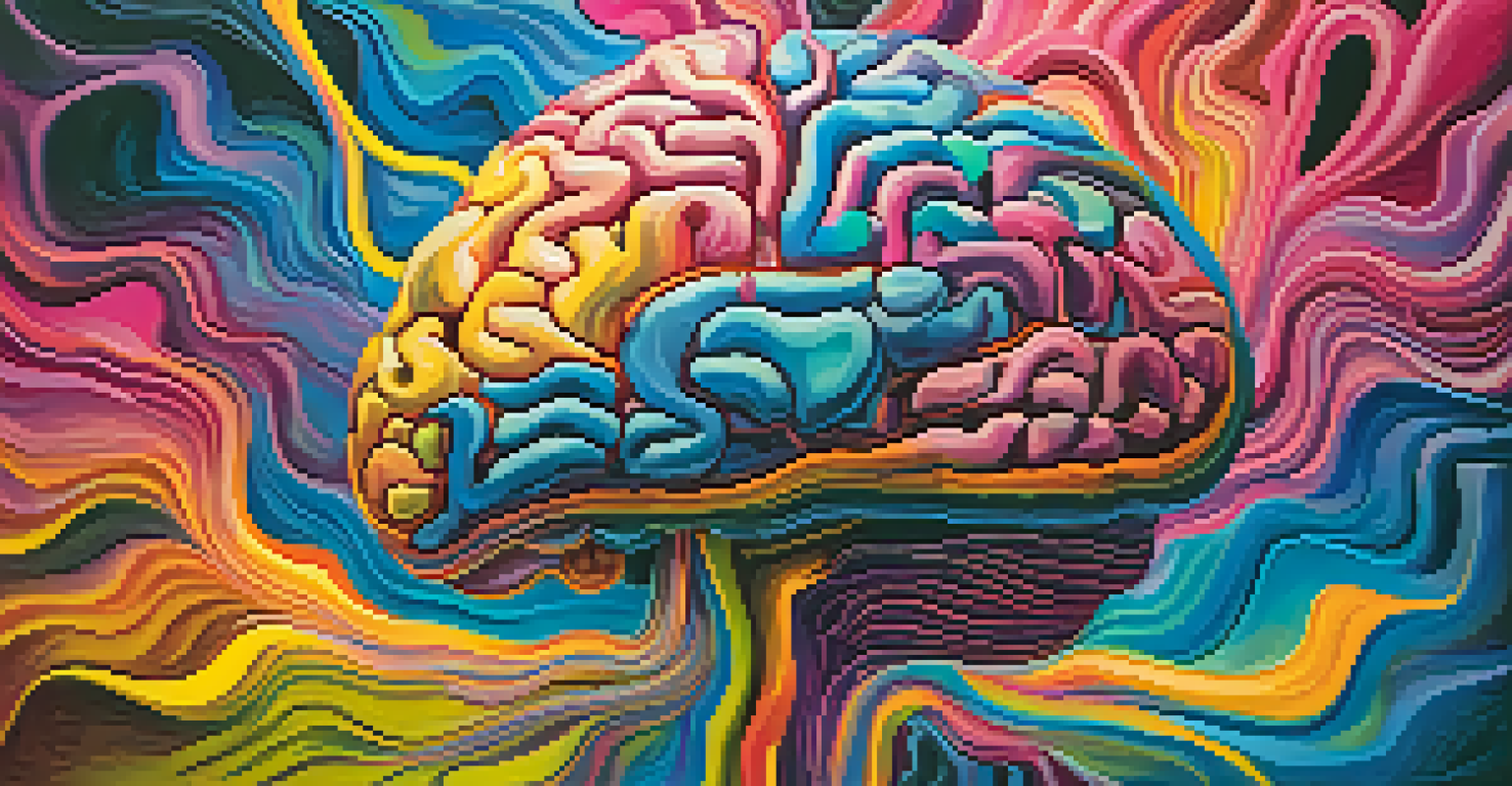Hallucinogenic Drugs: Memory Distortion and Recovery

What Are Hallucinogenic Drugs and Their Effects?
Hallucinogenic drugs, including substances like LSD and psilocybin, can profoundly alter perception, mood, and cognitive processes. These drugs interact with neurotransmitter systems in the brain, particularly serotonin, leading to immersive experiences that can distort reality. Users often report vivid visual and auditory hallucinations, alongside an altered sense of time and self.
The mind is everything. What you think you become.
While many people seek out these substances for recreational or therapeutic reasons, the impact on memory is a critical area of concern. Memory distortion can occur, leading to altered recollections of events or experiences that might never have happened. This can complicate a person's sense of reality and can have lasting effects on their mental health.
Understanding the effects of these drugs is essential for both users and healthcare providers. The potential benefits of hallucinogens in therapeutic settings are being explored, yet awareness of their risks, particularly concerning memory and cognition, is equally important. As research continues, the conversation around these substances is evolving.
How Hallucinogens Distort Memory Function
Hallucinogens can lead to significant memory distortion, affecting both short-term and long-term memory. This distortion can manifest as difficulties in recalling recent events, altered perceptions of past experiences, or even the creation of false memories. For example, a person might vividly remember a hallucinated event as real, complicating their understanding of what actually happened.

The brain areas involved in memory, particularly the hippocampus, may be affected by these substances, resulting in impaired memory encoding and retrieval. This means that while a user may experience intense emotions or sensations during a trip, their ability to accurately recall those moments later can be severely compromised. Such experiences may lead to confusion and disorientation after the drug's effects wear off.
Hallucinogens Alter Memory Processing
Hallucinogenic drugs can significantly distort both short-term and long-term memory, leading to altered perceptions and potential confusion.
It’s worth noting that the impact of hallucinogens on memory can vary widely among individuals. Factors such as dosage, setting, and personal psychology play a crucial role in determining how significantly a person’s memory might be affected. Understanding these dynamics is important for both users and therapists exploring the therapeutic potential of these drugs.
The Role of Context in Memory Distortion
Context plays a pivotal role in how memories are formed and retrieved, especially under the influence of hallucinogenic drugs. The environment where the drug is consumed — whether it’s a party, nature, or a clinical setting — can shape the experiences and memories created during the trip. A serene setting may lead to more positive memories, while chaotic surroundings might contribute to negative or confusing recollections.
You cannot solve a problem with the same mindset that created it.
This context-dependent memory phenomenon can create a complex interplay between the drug's effects and the environment. For example, if a user has a profound realization while in a peaceful setting, they may associate that insight with the location rather than the drug itself. Conversely, a distressing experience in an unsettling environment can lead to long-lasting negative memories associated with both the drug and the setting.
Recognizing the importance of context is crucial for anyone considering the use of hallucinogens, especially in therapeutic contexts. Therapists and researchers must consider how different environments can influence not only the experience but also the memories that are created. Understanding this can help in designing safer and more effective therapeutic settings.
Potential Therapeutic Uses of Hallucinogens
Recent studies have begun to explore the potential therapeutic benefits of hallucinogenic drugs, particularly in treating conditions like PTSD, depression, and anxiety. Researchers suggest that these substances can facilitate emotional breakthroughs and healing, enabling patients to confront painful memories in a controlled environment. By altering memory processing, hallucinogens might help individuals reshape their narratives and experiences.
For instance, patients with PTSD may benefit from guided therapy sessions using substances like MDMA or psilocybin, which can help them process traumatic memories without the overwhelming emotional burden. This therapeutic approach can create a safe space for patients to explore their feelings, potentially leading to significant breakthroughs in their mental health treatment.
Context Shapes Hallucinogenic Memories
The environment in which hallucinogens are consumed plays a crucial role in shaping the experiences and memories formed during their use.
However, it's important to approach these therapeutic uses with caution. The potential for memory distortion remains a concern, and more research is needed to understand the long-term effects on memory and cognition. As the field evolves, balancing the promise of therapeutic benefits with the risks of memory distortion will be crucial.
Memory Recovery After Hallucinogenic Experiences
After the effects of hallucinogens have worn off, many users report a mixed bag of memory recovery. Some may find that their memories of the experience become clearer over time, while others might struggle with confusion or gaps in memory. This can lead to a sense of unease, as individuals grapple with what is real versus what was a product of their altered state.
Recovery of memory can be influenced by several factors, including the individual's mental state before the experience, the type and dosage of the drug, and the support they receive after the experience. Engaging in reflective practices, like journaling or discussing the experience with trusted friends, can help facilitate memory recovery and integration of the experience into their life.
Moreover, therapeutic support can play a significant role in memory recovery. Professional guidance can help individuals navigate their experiences and address any confusion or lingering effects. Ultimately, the path to memory recovery is unique for each person, emphasizing the need for personalized approaches.
The Importance of Integration in Healing
Integration is the process of making sense of the experiences and insights gained during hallucinogenic trips. This step is crucial for individuals seeking to heal from past trauma or emotional distress, as it helps them reconcile their experiences with their everyday lives. Without proper integration, the valuable insights gained during a trip might fade into confusion or distress.
Therapists and integration coaches often guide individuals through this process, helping them articulate their experiences and apply new insights in constructive ways. For instance, someone might learn to approach anxiety with a new perspective after a hallucinogenic experience, but without integration, those insights could remain unutilized.
Integration is Key for Healing
Proper integration of insights gained from hallucinogenic experiences is vital for individuals to effectively reconcile these experiences with their everyday lives.
In conclusion, integration serves as a bridge between altered states of consciousness and everyday reality. By valuing this process, individuals can enhance their healing journey, ensuring that the lessons learned during hallucinogenic experiences lead to meaningful changes in their lives.
Final Thoughts on Hallucinogenic Drugs and Memory
Hallucinogenic drugs offer a fascinating glimpse into the depths of human consciousness, but their effects on memory are complex and multifaceted. While they can facilitate profound insights and emotional healing, they also carry the risk of significant memory distortion. Understanding these dynamics is crucial for both users and professionals working in therapeutic settings.
As research into hallucinogens continues to grow, so does the need for informed conversations about their potential risks and benefits. Open discussions can help demystify these substances, making it easier for individuals to navigate their experiences safely and effectively. It’s important for users to educate themselves and consider the implications of memory distortion in their journeys.

Ultimately, the relationship between hallucinogenic drugs and memory is a powerful reminder of the intricate connections between our minds, our experiences, and our realities. By approaching these substances with care and respect, we can explore their potential while remaining aware of their complexities.